Michael Cheika says rugby must unite if the Wallabies are to rebound after World Cup failure
Former Wallabies coach Michael Cheika says Rugby Australia must rebuild with the interests of the local game as its sole concern, while revealing how a ‘lack of alignment on off-field issues cost us’ at the World Cup.
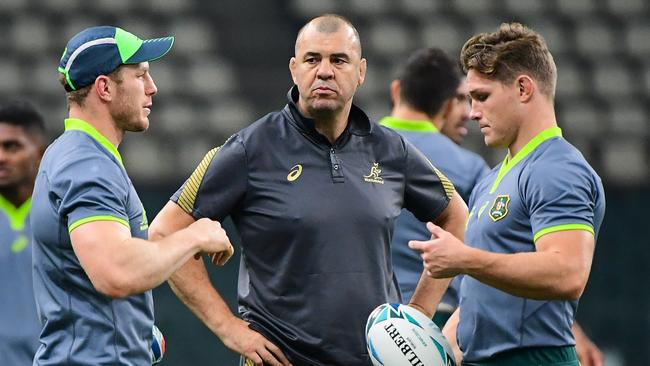
Rugby
Don't miss out on the headlines from Rugby. Followed categories will be added to My News.
For the last few months Michael Cheika has enjoyed every moment in the Sydney Roosters inner sanctum. There, working as a consultant alongside his friend and Roosters coach Trent Robinson, Cheika has been reminded of the power of a footy team in strong “alignment”.
But it’s been strange experience at times because, in his 20 years coaching, including five at the helm of the Wallabies, he has always been the boss of the team.
“It’s weird,” Cheika said. “And it’s the first time in 20 years I haven’t been preparing for a rugby season. And I’ve never not been the boss, I’ve never been in an environment when I am contributing but I am not making the final decisions …”
In his first interview since exiting the Wallabies with an almighty, honest bang last October, he tells The Australian he’s learnt a lot at the Roosters and grown, again, as a leader.
Cheika also spoke about those tough, tenuous moments in his last days as Wallabies coach, his ambitions for a top post somewhere in world rugby and maybe with Australia again.
“I don’t think I am very loved by the current leadership,” he said. “I’m still ambitious about coaching, that’s not going to be an option here, right now. I suppose I am going to have to go overseas … I’m still hungry to coach. I love match day. Love the challenge. Love the idea of making players improve and believe in themselves.”
“I want to be in a place where everyone is aligned. That’s one of the reasons I have enjoyed being around the Roosters.
But today, as with everyone, Cheika is living with uncertainty after world sport ground to a halt because of COVID-19.
The NRL shutdown has put his Roosters job on hold. Possible European coaching options for later in the year are now off the table.
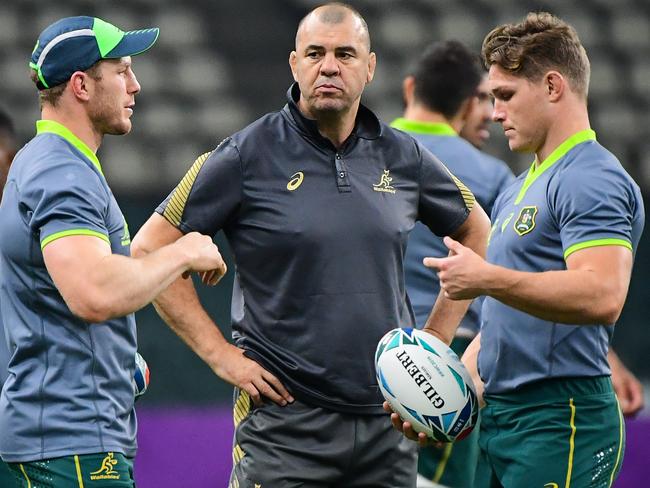
Cheika speaks from his home office, currently in “self-isolation”, having recently returned from overseas where he did his first stint as a commentator (which he loved). And he admits to being the kind of guy who just “goes with the flow”.
“I am not in a state of flux at all, it’s been a pleasure being involved with the Roosters. That whole thing has shut down, but when the game starts up again I am sure I will be welcomed back in with the guys,” Cheika said.
“It’s been really great for me, it’s been a good way to learn and see a different way of doing things. You just need to be measured right now. Look after what is important. And help other people as well who are vulnerable. When the time for sport is ready again, we will be back to play.”
He’s had a bit of time to reflect now on the tumult of the World Cup. He said the Wallabies didn’t master the key, small moments in the tournament.
“If I compare it to the 2015 experience, they’re the moments we did master,” Cheika said. “It’s nothing to be embarrassed about. This is the World Cup. It’s not some mickey mouse competition, you are just rockin’ up and seeing how you go. The margins are fine.”
Upon Australia’s exit from the World Cup in the quarter-finals, Cheika, never one to filter himself spoke honestly about having “no relationship” with Rugby Australia chief executive Raelene Castle and its chair Cameron Clyne.
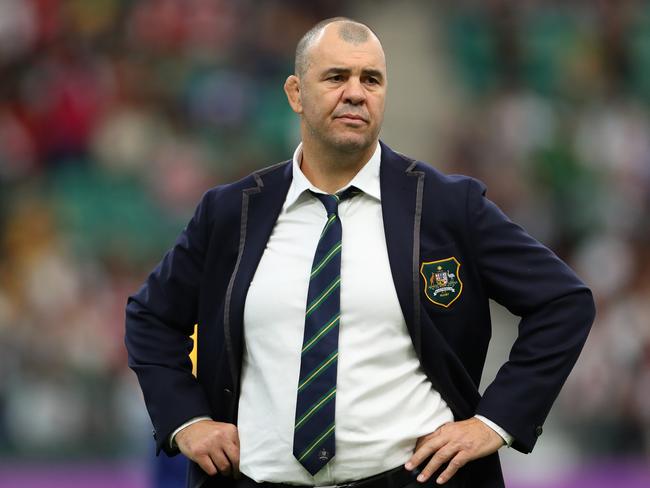
He doesn’t want to go deep into what happened, the tussles he had with management, especially the blow-up in the Australian embassy garden with Castle.
He does say the slow, general breakdown between front office and himself was in part a “failure” of his own making.
“As a leader myself, even if I have superiors, I have to be able to manage them as well and my team,” Cheika said. “In this instance, I wasn’t able to do it. I consider it a failure of my own, that I wasn’t able to convince those people that what I was proposing was better than what I was thinking.
“There were a few people above me who thought their way of doing things was better than mine.”
It all filtered down onto the field.
“A lack of alignment on many of the off-field issues cost us,” Cheika said.
“The big ticket things that happened, the way they were dealt with, affected the alignment, gave too much opportunity for too many ways of thinking. You need everybody thinking the same way when it comes to those sorts of things. I am a big believer that you need to trust the sporting side of your organisation — and the business people need to stay out of it. It’s called trust.
“Good teams need trust … and when there’s no trust …”
He said the Israel Folau contract drama could have been handled better by RA.
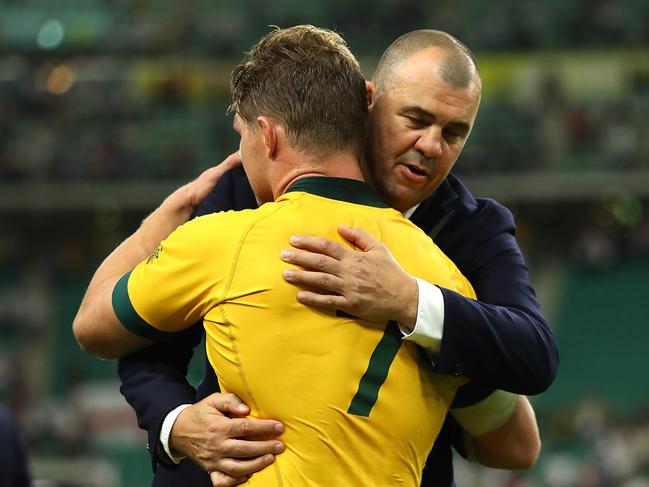
“It shows that with the changing times, that player contracts need to be clearer, not cut and paste,” he said. “That sporting bodies, internal regulations need to be very clear and up to date. Modernised. That is real clarity. When you start, not when you finish.”
He says his time at the reigning NRL premiers the Roosters — who famously have a strong club culture from top to bottom — reminded him of the importance of it all. Being at the Roosters, Cheika points out, reminds him of when he coached the Waratahs and the Wallabies in 2015. The Tahs made up around a third of the national team.
“That continuous strong messaging is so ultra-important,” Cheika said. “What I see in the Roosters is a lot of alignment from the top down, alignment between the owner, the CEO, the coach, the captain; they’re very aligned.”
Before COVID-19 came along rugby union was already in a mess, yet to secure a TV rights deal — with Fox Sports walking away from the table. Clyne, who has since stepped down as chair, and Castle’s management has come under intense criticism.
While there are many issues facing the game. Cheika said one thing is clear.
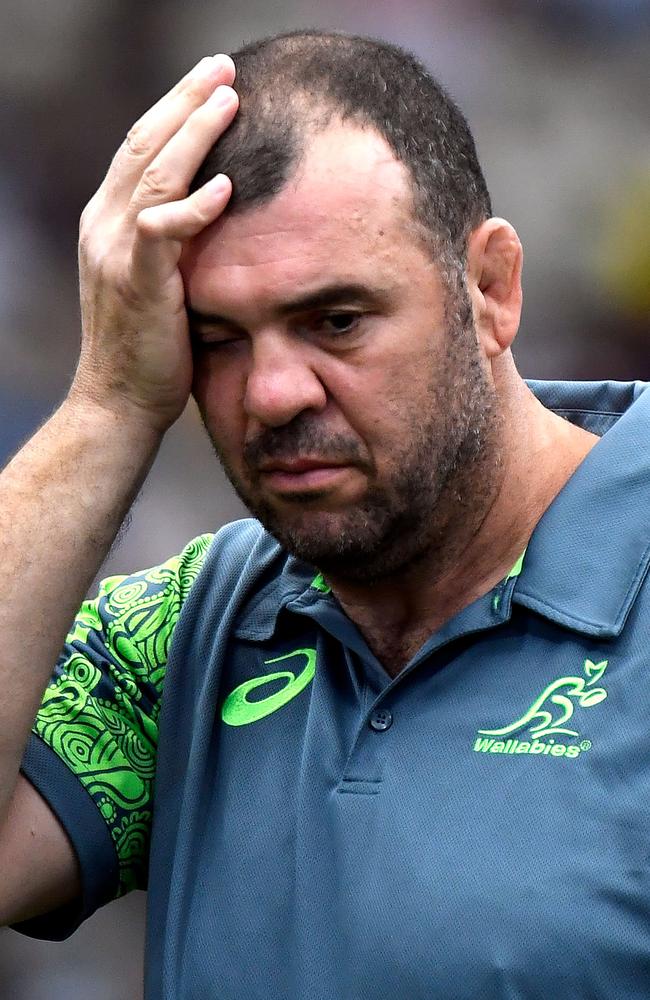
“We need to put the game in Australia first,” he said. “Our game first. Whether it is Shute Shield, or the Cup in Brisbane, over in Perth, junior rugby, professional rugby; the decisions made need to be made in the best interests of Australian rugby.”
“Whatever the leaders of the game decide, it has to be with the best interests of Australia, and if that burns us with a couple of countries, so be it.”
Cheika said there needs to be a firm focus on developing the grassroots, participation and developing the fan base.
That means more Australian teams on in appropriate timeslots on TV and more home games.
“As it stands the Waratahs can have one game at their home ground every four weeks — that makes it very difficult to build a following,” he said. “Everyone seems too scared to say it, because it will put Super Rugby nose out of joint, but the reality is, it is happening in front of us.”
He adds: “I don’t know what the economics are going to be in the future. All sport is going to change significantly after this. The way the cost structure, the revenue models are going to be, the professional end.’’
Cheika has been in contact with clubs and nationals teams overseas but is yet to decide what he will do next. “The coaching ambition is still there,” he says.
MORE RUGBY
PAY CUTS, JOB LOSSES: RUGBY IN PERILOUS STATE
Originally published as Michael Cheika says rugby must unite if the Wallabies are to rebound after World Cup failure

